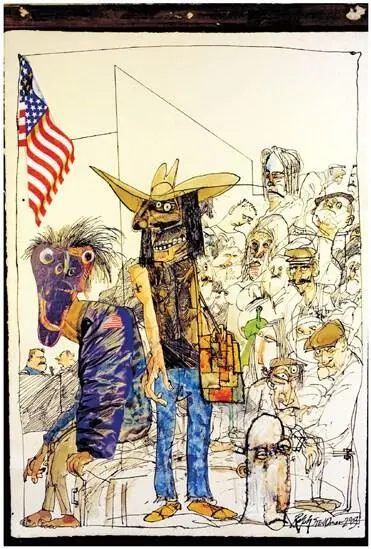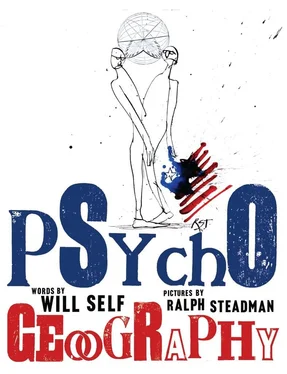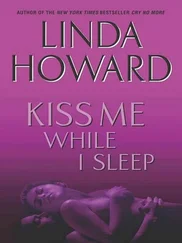A frozen moment at US Immigration, JFK Airport, New York. My British passport is scanned, the official scrutinises the computer screen with a worried expression and then politely asks me to go into the back room. I join what look like a hundred Koreans and a miscellany of other potential personae non grata. A Frenchman is being noisily grilled by an immigration officer at a high desk. The officer looks like an ugly, acne-scarred version of Jim Carrey, the Frenchman looks preposterous: fur-trimmed jeans, a leather patchwork shoulder bag, collar-length hair. Frankly, I wouldn’t try to get in to Legoland looking like that — let alone post-9/11 America.
‘You say you’re a philosophy teacher,’ the officer insinuates, ‘in Grenoble, but you seem to spend an awful amount of time here.’
‘Yez, like I say, I ’ave ze girlfriend.’
‘Yeah, yeah, I know that, in Manhattan, and you’re in and out of here like a yo-yo. There are stamps here,’ he riffles the French passport, ‘for every month of the last goddamn year.’
The Frenchman shrugs: ‘She is my girlfriend.’
‘Hey, whatever,’ the officer is suddenly bored. He stamps the passport and beckons me up. ‘Now, Mister Self, are there some little things you maybe aren’t telling us about yourself?’
‘Well,’ my voice drawls from deep in clubland, ‘there are perhaps one or two trifling drug offences, ancient history really.’
‘We’re going to have to deport you; you cannot come in on a visa waiver form with prior narcotics convictions. You’ll have to go back to London and apply for a visa there.’ My heart sinks then steadies.
‘Look, officer,’ I say, ‘would it make any difference if I told you that I was an American citizen?’
The Jim Carreyalike scrutinises me intently. ‘What makes you think that?’
I tell him that my mother was a citizen, born in 1922 in Columbus, Ohio, and that she registered me at the US Embassy in London when I was born. Carrey says he will check this information out, and shoos me back to the bolted-down seats.

Over the next two hours all the Koreans and some Africans with impressive cicatrisation scars are admitted to the Land of the Free. The only people left are me and a silently weeping German family, comprising late-middle-aged parents and a grown-up daughter. Apparently the paterfamilias failed to get an exit stamp in his passport when he departed in 1987. Jim Carrey and I have struck up an acquaintanceship; we suck mints together and listen to Miles Davis’s Kind of Blue played on the CD-Rom drive of his computer terminal. Finally, he beckons for me to follow him and leads me back through a warren of offices. ‘I’m taking you back here,’ he confides, ‘because we’ve decided to admit you, but we’re going to deport the Germans and. . ’ he pauses significantly, ‘I don’t want to upset them any more than necessary.’
In the back office sits an older, heavier-set man with a strict moustache and iron-filing hair. The Stars and Stripes limps on the flagpole by his desk. He looks up from studying my passport when Jim and I enter.
‘So, Mister Self,’ he asks without preamble, ‘what exactly do you think you are?’
‘Um, well, a dual citizen, I suppose.’
He breathes heavily. ‘Mister Self, I have been an immigration officer for thirty-five years and let me tell you something: you are either an apple or a pear.’ He pauses, allowing this fructuous moment to dangle between us. ‘I don’t care if you choose to live in London, I don’t even mind if you travel on a British passport when you’re abroad, but let me tell you this,’ his voice begins to quaver with emotion, ‘when you come here to the United States of America you are an American citizen!’
I snap to attention. ‘The Battle Hymn of the Republic’ swells in my inner ear as I deftly circle my covered wagon in front of the Lincoln Memorial, leap out and march forward to receive the Pulitzer. ‘Sir, yes sir!’ I bark. On the way out Jim Carrey passes me my British passport.
‘I don’t even want to hold this,’ his voice is also choked with patriotism, ‘because it offends me to see you travelling on such a document.’
Now, a few months later, I am the proud possessor of an American passport, and to begin with I felt pretty strange about it. To tell the truth I’ve never felt my nationality defined me any more than my shoe size (actually, since my shoe size is 12, a good deal less), but since actualising my Americanness I’ve given a good deal of thought to whether I feel American, or British, or European — or anything. Am I in fact a citizen of a vast Oceania which stretches from Brest-Litovsk to Honolulu? But on consideration, weighing up all the geopolitical, historical and cultural factors, it’s dawned on me that the possession of two passports means one thing and one thing alone: shorter queues on embarkation either side of the Atlantic. I’m not an apple or a pear, I’m a banana skin, glissading through immigration.
Sitting in a soft-stripped flat on the twenty-first floor of a semi-abandoned tower block in the Kensington district of Liverpool I am temporarily the highest resident on Merseyside. I can see the sunlight dapple the flanks of Snowdon nigh on seventy miles to the south. I can see the Wirral like a spatulate tongue licking the Irish Sea. I can see the Mersey itself, coursing through its trough of defunct docks. Towards Bootle the gargantuan sails of wind turbines look like propellers powering the upside-down burgh through the steely grey sky. Ranged across the mid-ground are the signature buildings of the city: the Liver Buildings with their sentinel herons; the mucoid concrete of the hospital; the dirty white stalk of the radio station with its restaurant revolving like a conjuror’s plate; and the two cathedrals, one the outhouse of the morally relativist gods, the other a split yoghurt pot oozing spiritual culture.
The grid of streets spreads out from the base of my tower, a tight stacking of tiled roofs which gleam wet with rain. I sit here from dawn to dusk watching the weather systems roll in, completely divorced from the human life of the city. The block will soon be demolished. Twenty years ago tens of these concrete snaggle teeth gnashed Liverpool’s flesh — but they’ve mostly been extracted. Draughts sough in the empty corridors and cavernous stairwells. As the block is emptied out so is the city itself; and, despite endless talk of regeneration, the fact remains that Liverpool has halved in population since the second war. To apprehend this you have only to observe the slow trickle of outward-bound traffic which is the rush hour, or descend into the financial district at 5.30 p.m., where you’ll find hardly anyone at all. The impressive Victorian municipal buildings lower in the dusk, stage sets for an epic long since wrapped.
Occasionally the Wirral is too tantalising and I grab my foldaway bicycle, sprint to the lift, plummet to the ground, freewheel all the way down the hill to the Pier Head and take the ferry across the Mersey. ‘Ferry ’cross the Mersey!’ sings Gerry over the tannoy, while the Pacemakers plink-plonk their accompaniment. This is a moment of maximum urban quiddity, the song hymning the vehicle while you’re actually on it. It’s like a busker singing ‘Streets of London’ in the streets of London, at once sweetly homely and infinitely claustrophobic. But all too soon we’ve heaved to at Seacombe and I’m pedalling along the magnificently sculpted Wallasey Embankment past the tidy villas of Egremont. On and on, the peninsula curving and curving to my left as I circumvent the last resort of New Brighton.
Читать дальше













